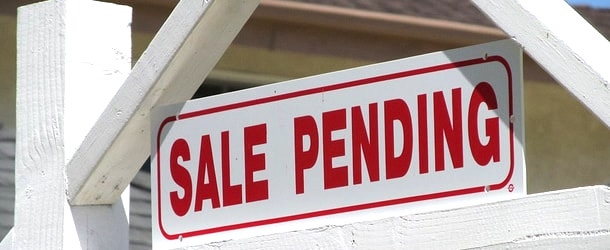
While the recent stock market boom, coupled with near-record low mortgage rates will undoubtedly make prospective home buyers feel richer, lofty asking prices may have the complete opposite effect.
Regardless of what happens to the economy this year, chances are that those who are planning to buy a home will, assuming they can find one that suits their individual needs.
If you happen to be selling a property in 2021, conditions might be a little different this year than in past years.
Let’s talk about that and some potential home selling tips to help you get top dollar if you decide to list.
1. It’s Still a Seller’s Market for Most
Similar to talk of the low mortgage rates going away, which still haven’t, we’ve been told year after year that the seller’s market is coming to an end.
Sure, it will at some point, but my expectation is another solid year for home sellers, with prices expected to rise an additional 10% in 2021.
The difference this year from last might be even more bidding wars and increased desperation from home buyers willing to spend more.
In other words, expect more offers, and perhaps fewer days on the market before an offer arrives. Same goes for how many of those offers go above asking.
Of course, this doesn’t mean you can’t list at any price point and still get bids above that level.
You should still be reasonable and perhaps even list below a key pricing threshold to drive interest and get your listing to hit “Hot Home” status.
2. Know Your Buyer and Appeal to Them
Along those same lines, if you’re selling a home in 2021 you’ll want to ensure it is well-maintained and on point design-wise.
The types of homes you see sitting on the market these days are consistently not updated and often not priced to take that into account.
Sure, home buyers are desperate, but they know a junker when they see one and those can and will still sit.
If there are doilies everywhere and silly curtains on all the windows, younger buyers (namely Millennials) may not be able to look beyond that.
In my mind, if these properties simply got a fresh coat of paint and underwent some minor tweaks, perhaps a little modern staging too, they could command the price being requested.
Heck, even the addition of a Nest thermostat and other smart home gadgets can get otherwise disinterested buyers excited.
Same goes for little touches like new wall outlet plates, faucets, knobs, and other finishes that can make old fixtures look new. Cheap but effective.
Of course, it will all depend on your unique property and individual housing market.
Properties in the first-time buyer category will likely remain hot, regardless of whether they’re updated or not because there will always be more eligible buyers in that category.
More expensive homes may sit longer unless the seller (and agent) really take the time to determine what a prospective buyer looks like in their area and caters to that.
Still, it could still make sense to make these small adjustments to garner even more interest and a higher final selling price. The ROI could be well worth it.
In other words, just because your home is easy to sell right now doesn’t mean you should just settle. Make it even more appealing while the market is hot!
3. Photos and Staging Matter, More Than Ever
Real estate is very emotional, whether prices are high or low. While economists talk numbers, home buyers and sellers lead with their hearts.
One of the most important things you can get right (or very wrong) is photographs. Ultimately, unless you or your real estate agent is a photographer by trade or serious hobby, you’ll need to hire a pro.
The good news is it should be a small price to pay for a very meaningful return. After all, buyers can now peruse listings online or via their smartphone, and pictures pretty much take the lead.
An appealing cover shot will stand out in the crowd. A professional photo taken with the right camera, right lighting, and right angle/composition can work wonders.
Conversely, a poorly-lit photo that’s crooked or out of focus (and complete with a timestamp) could sink your listing even if the house itself is great.
One actionable tip is to make your best photo the featured one, even if it’s the kitchen. It doesn’t need to be the front of the house. It could be a sitting room or family room too.
Really, whatever pops the most. Because some prospective buyers may not bother clicking through to see the rest if they don’t like the first.
The same goes for home staging, which can make an enormous impact. It’s all about perception. Two identical houses can look completely foreign thanks to staging alone. Or simple decluttering. Or even cleaning!
Even though the real estate market is red hot these days, the seemingly small details matter more than ever because COVID means buyers are only venturing out to properties deemed worthy of an in-person visit.
4. Steer Clear of Discount iBuyers
Because it remains a great time to sell, there’s really no sense in using a discount iBuyer like Opendoor, Redfin Now, or Zillow Offers. You know, the companies that can apparently sell your home in a week or less.
If the housing market is strong, why resort to a veritable fire sale? Sure, it might take a little longer to sell via traditional means, but it can be well worth your time and energy to do so.
You shouldn’t feel at all desperate in today’s climate, though I suppose there are always going to be situations that might warrant a very fast home sale, such as if you’re also buying.
In those cases, you might want to avoid a contingency sale, which is understandable with today’s wait-for-nobody market.
But if you can, going the conventional route should be the way to sell a home in 2021.
5. But a Discount Real Estate Brokerage Might Work
On the other hand, it might be worth looking into a discount real estate brokerage, those that charge less than the typical 2.5-3% listing fee.
A few examples include Redfin, which charges just 1%, but you’ve also got the buyer’s agent fee to worry about, and REX, which charges 2% total by eliminating the buyer agent commission entirely.
There are many others, including some that charge a flat fee or nothing at all, with the latter requiring that you use them on your next real estate transaction.
This is always a controversial topic because full-service real estate agents will argue that they provide more for very little cost that is often recouped via a higher sales price.
In other words, a full-service agent may sell your home for more money and their higher commission is essentially absorbed, but whether that actually happens isn’t guaranteed.
Just know what you’re getting and if you do decide to go it semi-alone – you’ve got to know what you’re doing and know your property and real estate market really well.
6. Consider Pricing Below a Key Threshold
This should go without saying, but I constantly see homes listed above certain psychological pricing tiers.
For example, should you list at $405,000 or $399,000? While it’s perhaps debatable, you’ll probably get more eyeballs on your listing if you list just below $400,000.
This is partially to do with how filters work on popular home listing websites and apps, and partly to do with how the human mind works.
At the end of the day, the final sales price could be well above $405,000, even if you list a lot lower.
But you may never get your property in front of the users who set their maximum purchase price filter to $400,000.
Also note that buyers are keenly aware of things like Zestimates and Redfin Estimates, whether accurate or not. So listing below these numbers might also boost buyer appeal.
Just be sure you get enough interest to sell above list if you desire that higher sale’s price.
You could argue that listing low is risky, but the same can be said about listing high, then having to reduce the price after the fact.
7. Vet Your Real Estate Agent
If and when you decide to list, vet your real estate agent and ask them what the game plan is.
While it’s generally a no-brainer to list and get top dollar these days, that shouldn’t mean settling or throwing out the basics.
Your agent should still know what price points work for certain neighborhoods and layouts, and list accordingly.
So you’ll want to know the exact approach the real estate agent plans on taking to get your property sold quickly (if you want it sold fast) and for an optimal price.
Are they going to list low and hope it becomes a “Hot Home” on Redfin, or hold their ground at a higher price point and be patient?
You should discuss all these particulars early on before you list and have regrets. Getting these details right matters regardless of how strong the real estate market is at the moment.
8. Find Out How Home Prices Will Fare in Your City
It’s one thing to work with a good real estate agent, and another to be an informed home seller. Do your own research on your local market to see how home prices will fare in 2021.
Take a look at your city and metro too, along with national home price projections. Get a feel for the market temperature so you can set a realistic listing price with your agent.
Don’t just take their word for it. There are plenty of websites that offer up free home price projections, including the usual suspects like Zillow and Redfin, along with state Realtor groups, NAR, and private companies like CoreLogic and First American.
Pay attention to the news, but also keep an eye on comparable sales in your neighborhood.
Fire up Redfin to see what sold nearby your property recently. Check out how long it was listed, what it sold for versus the list price, and how it compares to your home.
You might even gain some valuable insights into what your home lacks that can be easily remedied before throwing it on the market.
If a nearby home sale did particularly well, determine how you can emulate it or even beat it!
9. Make Your Listing Exclusive
I’ve seen this done – and it worked beautifully. The real estate agent held a single open house. Just one. The property was packed that day. It felt like a circus and created a lot of buzz.
If you’re a prospective buyer and you see other potential buyers inside the very home you’re thinking about bidding on, emotions run high. And fear of missing out runs even higher.
It can be a successful strategy if the property is in a desirable area and meticulously updated. The one example I mentioned ended up going under contract in a few days and went something like $100,000 over asking.
In reality, the property wasn’t all that amazing or unique, but the agent created a feeling of exclusivity.
The same effect can be delivered by deferring any showings to a particular date and time, with only qualified buyers who are represented by agents allowed to view the property.
The goal is overlapping buyer traffic and hopefully multiple offers all in the same small window, which could result in a bidding war.
With COVID restrictions in place, this can still be done, with staggered showings and prospective buyers told to wait in line, in their cars.
While they watch others tour the home, they may become increasingly anxious about the competition, even if none of those other buyers actually express any interest.
10. Wait for the Right Time of Year to Sell
Another important consideration is timing. We’ve got another 340 days or so to list properties in 2021. Not all days are created equal!
Conventional wisdom says to list a home in spring if you want to fetch the highest sales price for your home. Day of week can also matter.
However, this can and will vary based on your market and property type. Zillow has a handy feature for sellers on the owner view of their website.
Once logged in, you can scroll down to “Best Time to List” to find out when they think you should sell, based on their data crunching.
It will tell you which month has been best historically based on seasonal patterns of similar properties.
Of course, if you’re also buying a home at the same time, you’ll have to factor that in too, as the best time to buy a home might be in late summer.
11. Qualify Your Buyers Before They Visit
Similar to last year, the COVID pandemic is making everything more difficult, whether it’s a trip to the grocery store or a much more important home sale.
While your real estate agent should be on top it, certainly make sure prospective buyers are fully vetted before they arrive.
This means absolutely no lookie loos of any kind, and a verified pre-approval letter in hand. Ideally, one that has actually been underwritten by a mortgage lender.
Sure, you want as many potential buyers as possible, but you also need to limit the foot traffic to keep everyone safe.
This means only the very serious and qualified buyers should step foot in your home.
While you’re at it, take a hard look at their pre-approval letter beforehand to see how strong of an applicant they are.
Can they put down 20% on the home purchase, or is a 3% down payment all they can muster?
It might matter because homes are being scooped up above asking, and often above the appraised value too.
This means the buyer might need to increase their down payment to make the mortgage financing work.
Those with only a small amount of assets may need to walk away in these cases, which can hurt your home’s marketability.
12. Be Prepared for Your Next Home Purchase
A common, yet tricky move at the moment, is selling and buying a property concurrently. It can be especially difficult thanks to the lack of inventory that continues to plague the market.
And because mortgage lenders aren’t as liberal as they once were, getting a home loan, or floating two at the same time, can be a deal breaker.
One thing I’ve seen people do recently is sell before buying a replacement. This makes their property a little hotter because there are fewer contingencies, or negotiating chips available for the buyer.
But it also means finding a new house quickly, assuming their temporary digs aren’t ideal.
[When should you start looking for a house?]
Another alternative is to ask for a rent-back from the buyer where they allow you to stay for a month or two until you find a new home to purchase.
Of course, selling contingent on finding a replacement isn’t out of the question if the property/market is hot enough, but most will try to avoid it.
The property aside, make sure you’re pre-approved for a mortgage and ready to go on the financing front.
You should have a good idea of what the sales proceeds will look like and how much you’ll be able to afford on the next purchase.
Begin looking at homes immediately as if your property has already been sold.
In summary, I believe 2021 will be another amazing year for home sellers, and perhaps even better than last year.
And when you look at how strong the housing market has seen since bottoming nearly a decade ago, it says a lot.
Home prices are projected to rise 10%+ yet again and mortgage rates may fall or remain at their new low levels, which should help maintain an affordability balance.
If you consider home prices vs. income, we are still below levels since in 2006, meaning the housing market has more room to run.
While there has been some pessimism on the economic front and word of rising interest rates, I still feel like 2021 will usher in another very strong housing market.
Sure, it’s not an absolute guarantee that your home will sell for top dollar, but if you do your homework, focus on the seemingly small details, and take the time to do things right, it should pay off big time.
Read more: 11 home buying tips for today’s market.



